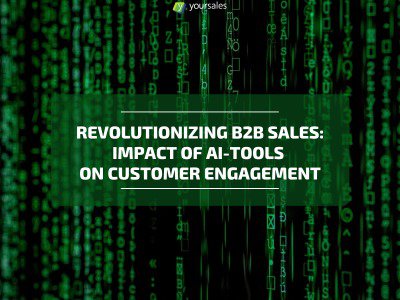Revolutionizing B2B Sales: Impact of AI-Tools on Customer Engagement
Amid the rapid evolution of the B2B sales domain, businesses need to integrate cutting-edge technologies to secure a competitive edge. The impact of AI-tools on customer engagement has been to take center stage as a transformative catalyst, fundamentally altering the dynamics of customer interactions for businesses. This article explores the impact of AI-powered tools on B2B sales, specifically honing in on customer engagement, and presents examples of AI applications that are reshaping the industry.
Understanding the Shift: the Impact of AI-Tools on Customer Engagement
Amid the rapid evolution of the B2B sales environment, AI emerges as a catalyst for change, fundamentally transforming how businesses engage with their clients. At the forefront of this revolution is AI’s capacity to have a positive impact on customer engagement.
AI possesses the ability to provide advanced personalization and predictive analytics, fueling the evolution of chatbots and virtual assistants. These tools facilitate a precisely tailored, personalized approach that resonates distinctly with individual clients. Moving away from the conventional one-size-fits-all model, this transition nurtures more robust and meaningful connections, establishing a symbiotic relationship between businesses and their customers.
Impact of AI-Tools on Customer EngagementEnhanced Personalization
AI’s notable impact on B2B sales lies in its capacity to provide personalized experiences on a large scale. By deploying sophisticated algorithms, AI meticulously analyzes extensive sets of customer data, granting businesses an in-depth understanding of their clients at a granular level. This insight empowers sales teams to tailor their approach, from marketing messages to product recommendations, fostering stronger and more meaningful connections with customers.
Predictive Analytics
AI-powered predictive analytics have revolutionized the sales forecasting process. By analyzing historical data and identifying patterns, these tools help businesses anticipate customer needs and behavior. This foresight enables more accurate inventory planning, reduces the risk of stockouts for physical products, and enhances overall supply chain management.
Most importantly, it fixes one of the biggest pain points in B2B Sales: lack of insight into the revenue stream. AI algorithms are able to make more accurate predictions of when and if potential clients will sign.
Impact of AI-tools on Customer Engagement: Chatbots and Virtual Assistants
AI-powered systems like chatbots and virtual assistants are reshaping customer interactions in the B2B sphere. These tools provide instant, round-the-clock support, answering queries, and guiding customers through the sales process. Chatbots don’t just operate on livechat either. B2B businesses are using AI implementation in email marketing as well, using email automation to provide in-the-moment responses to email from potential and current clients.
By automating routine tasks, sales teams can focus on more complex and value-driven activities, improving overall efficiency.

Examples of AI-Powered Tools in B2B Sales
AI-powered tools offer businesses unprecedented capabilities to enhance customer engagement, streamline operations, and make informed decisions. From automating the e-commerce experience to optimizing inventory management and elevating sales forecasting, these real-world implementations illustrate how especially generative AI is not merely a theoretical concept but a tangible force driving innovation and efficiency in the B2B sales ecosystem.
1. Digital Assistants for Meetings
Conversation intelligence through the use of digital assistants has been on a rapid rise during 2023. Prior to the launch of chatGPT only relatively few players were known. Post-chatGPT a myriad of solutions has emerged.
These types of solutions impact the customer journey by analyzing calls – especially video calls, but also regular phone calls – for cues in the conversation to run predictive customer analysis on. It’ll look for voice level changes, trigger words, sentiment, etc. Most of the time, in video calls, you’ll have the assistant present as an extra participant, and you can share the breakdown of the call with the buyer after the call.
Part of the aim is a personalized customer experience, which the insights may help you deliver. It’ll help you share relevant content after each call – just make sure you keep delivering the human touch as well.
2. Sales Forecasting
In the realm of sales forecasting, AI’s predictive capabilities bring a new level of accuracy and foresight. Tools like Clari leverage machine learning algorithms to analyze historical data, enabling businesses to anticipate market changes and align their strategies with future demands.
Clari’s AI-driven platform also provides real-time insights into sales activities. This data-driven approach empowers sales teams to focus their efforts strategically, identifying high-impact opportunities and mitigating potential risks.
3. Customer Relationship Management (CRM)
AI’s transformative influence extends to customer relationship management, where CRM systems are evolving to automate tasks and enhance customer interactions. These tools automate data entry, analyze customer interactions, and provide valuable insights to optimize communication strategies.
Several CRMs leverage AI to automate data entry and lead scoring, allowing sales teams to redirect their efforts toward building meaningful relationships. By analyzing customer interactions, these systems offer valuable insights that enable businesses to tailor their approaches, ensuring a more nuanced and effective engagement strategy.
4. Inventory Management
AI’s impact on B2B sales extends into the logistical domain, highlighting the importance of quality inventory management systems. By predicting demand patterns and optimizing stock levels, these tools prevent overstocking or stockouts, reducing costs and making sure that orders are fulfilled on time.
For example, Blue Yonder’s Inventory Optimization utilizes AI to analyze historical data and market trends, enabling businesses to maintain optimal inventory levels. This not only ensures timely order fulfillment but also minimizes carrying costs, enhancing customer satisfaction and operational efficiency.
Buyer Beware
As AI has become more prevalent, B2B buyers are starting to move as well. AI detection has become a thing. Buyers still prefer human contact in the complex B2B selling context. This is not surprising given how short Ai has really played a visible role in dialogue with buyers.
The buyer behaviour includes not engaging ANY dialogue whatsoever. That’s a problem for the companies they work for, which miss out on seller-led innovation. Clearly, it’s also a problem for sellers who have increasing problems getting in touch with buyers and opening conversations.
Thus far, the response to this move from sellers has been ever increasing amounts of technology-driven tricks: higher volume of prospects in at the top end of the sales funnel, more domains for email, more warm-up tools to make email successful, increasing personalization with AI tools for copywriting, and AI chatbots for both webchat, LinkedIn messaging, and email to name a few.
None of these dramatically change outcomes, though. B2B sellers will have to rethink their approach to opening and maintaining dialogue with their customers. Sometimes the choice will be to specifically NOT use technology, and instead go manual.
More than ever, it’s important to know and understand the available tools and use the right tool for the right job.
The Future of AI in B2B Sales
As AI continues to evolve, the possibilities for its application in B2B sales are limitless. The examples provided above serve as beacons of what’s achievable today, and the future promises even more rapid innovation. From augmented reality for virtual product demonstrations to natural language processing for more intuitive customer interactions and personalization, B2B businesses are poised to unlock new dimensions of customer engagement.
Adopting these technologies transcends mere choice; it becomes a necessity for businesses aiming to flourish in the competitive realm of B2B sales. It’s not about just picking the newest, most shiny tech, though. Investments in AI must go hand in hand with sound understanding of the dialogue one seeks with buyers.
Businesses that strategically and successfully incorporate these technologies are poised to spearhead the future of customer engagement in the B2B sector, establishing a groundbreaking standard for efficiency, personalization, and data-driven decision-making.
Artificial intelligence is here to help us! The question is: will you know when to use it and for what?


